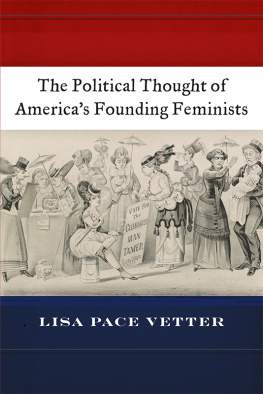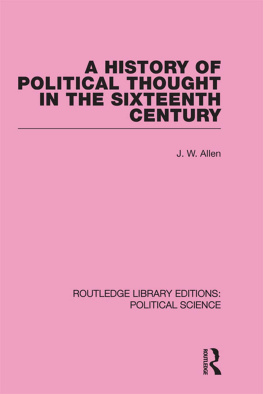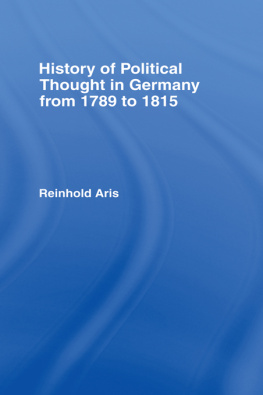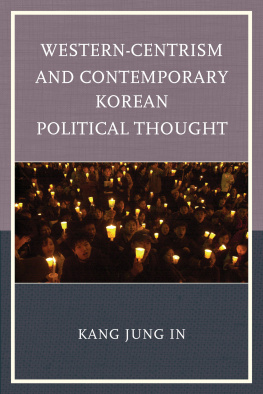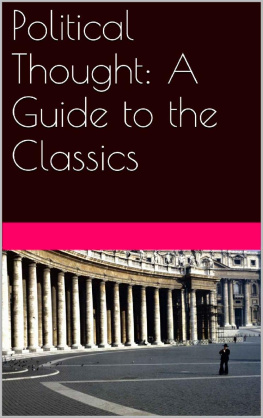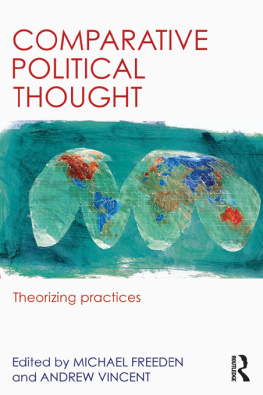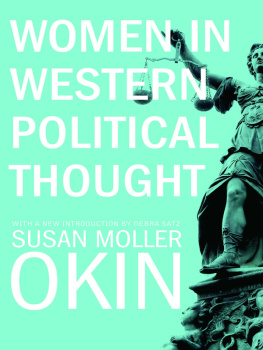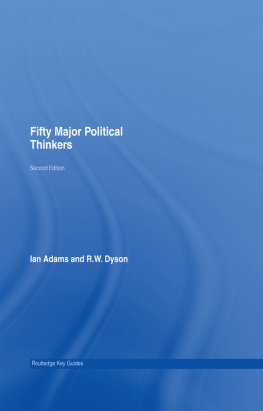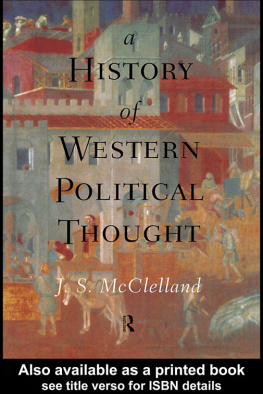A World History of Political Thought
To Fumie
A World History of Political Thought
J. Babb
University of Newcastle, UK

J. Babb 2018
Cover photograph: J. Babb (concept) and Dean Chapman (photographer).
All rights reserved. No part of this publication may be reproduced, stored in a retrieval system or transmitted in any form or by any means, electronic, mechanical or photocopying, recording, or otherwise without the prior permission of the publisher.
Published by
Edward Elgar Publishing Limited
The Lypiatts
15 Lansdown Road
Cheltenham
Glos GL50 2JA
UK
Edward Elgar Publishing, Inc.
William Pratt House
9 Dewey Court
Northampton
Massachusetts 01060
USA
A catalogue record for this book
is available from the British Library
Library of Congress Control Number: 2017960007
ISBN 978 1 78643 553 8
Contents
Preface
The main aim of this book is to identify the key political thinkers throughout world history. I have particularly tried to find and examine those that have had influence, substance and relevance. There is an implicit assumption in most histories of political thought that only Western political thought deserves to be given depth of treatment due to its greater value in some unspecified sense. However, there are certainly non-Western thinkers who should command more attention and Western thinkers who would benefit from being examined in world historical context. At the same time, it does not make sense if thinkers are treated as if they are all the same and of equal merit. The point is that one must make a case for the quality of any thinker and not merely base it on where and when the thinker was active.
It will also constitute a major achievement if this book can make anyone who refers to the History of Political Thought but only includes the West feel that they have misled their audience. That is, all histories of political thought focused on the West should be called a History of Western Political Thought. In a similar way, book editors should be embarrassed when they commission one or two token chapters that cover aspects of the non-West when Western thought is covered in much more detail. This book demonstrates that a more balanced history of political thought can be written.
By adopting a chronological approach, it is not surprising that this book puts an emphasis on historicizing political thought to demonstrate that it cannot be easily isolated from the political context in which it is created and subsequently used. Following from this, there is a need to be sensitive to the history of the text, that is, how it was created, and subsequently adapted and interpreted. This is particularly important for early texts. Even though there is a robust literature on the Buddhas Dialogues and the Analects of Confucius, it is not uncommon for scholars to ignore the best scholarship and attribute ideas to these thinkers that they are unlikely to have held. Even later texts, such as Dong Zhongshus The Luxuriant Dew of the Spring and Autumn Annals (), can require one confront these issues. When considering such texts, I will try to make my choices explicit in using or avoiding key sections.
This is A World History of Political Thought because there are many possible histories that could be written. The chapters in this book have been organized into roughly contemporaneous periods and certain themes have been teased out of the material to provide some coherence to the discussion. My main aim was to develop a vehicle to present the main thinkers and ideas in world political thought in a narrative form to tell the story of political thought as world political thought in its simplest outlines. It is important to have a narrative structure to this type of project. Many different narratives can be woven from the same raw material though not all narratives are equally valid or thought-provoking.
I hope the reader finds the way I have incorporated a wide range of material coherent enough to be useful in making sense of the variety of forms of political thought in world history. In many cases, I have been forced to rely on conventional interpretation to present a potted version of the political thought of most thinkers for the sake of simplicity and readability but here and there original evidence and scholarship should be apparent. Although the book can serve as a quick introduction to the thought of all the main thinkers presented, the goal is primarily to put the thinkers in global perspective and not serve as an introduction to each of the thinkers in detail. It is hoped that it will inspire others to pursue the comparisons and issues raised in more depth than was possible here.
For me personally, this is the book I would have liked to have had when I was starting to think about and teach the history of world political thought so, in many ways, this is meant to be a beginning rather than an end. Not everyone will agree with how I have presented the material in detail but it is meant to spur others to look at the potential of treating political thought as world history and not one divided into unrelated civilizations where the West is primus inter pares. There is already a trend in academia toward world history and comparative political thought but nothing on this scale has been attempted as far as I am aware. I know this is a ridiculously ambitious project but hopefully one that is a helpful starting point for a larger dialogue on how to study political thought in a worldwide context.
OVERVIEW OF THE BOOK STRUCTURE
The first chapter sets out the methodology used. It is fairly technical and may be skipped by anyone interested only in the history. The methodological discussion seeks to review and improve the practice of comparative political thought. It is based on my guidance to students in order to aid their writing of research papers on comparative political thought.
The main body of the book is in two parts. In the first part, the civilizations are relatively separate. There is some historical interaction between India, the Middle East and Europe, and between India and East Asia but it is usually slow and fitful. The initial discussion of world political thought begins with a relatively simple portrayal of three foundational thinkers. Then the development of the ideas of these early thinkers by their followers and opponents demonstrates the complexity of early theories of political thought everywhere. There is a lull as political ideas were stretched unreasonably to fit the demands of large empires and, then, heavy and sophisticated metaphysical apparatus were added to provide substance and legitimacy for the rulers who sought to take advantage of these political philosophies. This section devotes considerable space to so-called medieval political thought, usually skipped in histories of this kind in the West, often due to the bias of the Western Enlightenment and its more recent secularist legacy, but also because of the relative lack of political thought in the West in this period. Nonetheless, the medieval period everywhere is essential to an understanding of the basic metaphysics of political thought in the different civilizations. The influences of the metaphysical assumptions of this period still linger so must be highlighted.


